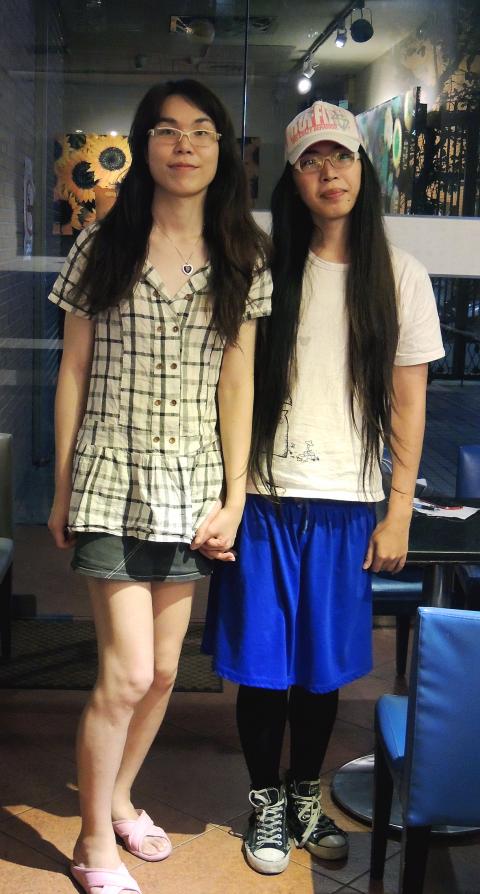Jiyi Wu (吳芷儀) is adamant that she is not a man. Or, for that matter, a woman.
“People wonder. I bought chewing gum once from a grandmother on the street and she asked me if I am a man or a woman,” said Wu, 29, who was dressed in a long blouse and had let her hair down.
“The answer is I want my body to be more feminine — that is why I had my surgery,” she said. “But my gender is fluid. I don’t think of it as female or male.”

Photo: Enru Lin, Taipei Times
Wu, who freely embraces other labels like housewife and professional cat lover, was born male, but began hormone treatment in 2007 and completed male-to-female sex reassignment surgery last July.
A few months after the surgery, Wu — who was still legally listed as a man — applied to marry longtime partner Abbygail Wu (吳伊婷), a transgender person who had already transferred her legal status from man to woman. The Household Registration Office (戶政事務所) approved the certificate for a union that was — on paper — between a man and a woman.
But to the Wus, theirs is not a marriage between a man and a woman, or a woman and a woman.
“We aren’t lesbians,” said 27-year-old Abbygail Wu, a software engineer.
Instead, she and her partner identify themselves as genderqueer — a “third gender,” said Jiyi Wu. “We are a genderqueer person married to another genderqueer person.”
ANNULMENT
Nine months in and their marriage is already on the rocks, though not for the usual reasons.
The Wanhua District Household Registration Office, under authorization by the Ministry of the Interior (MOI), has issued the couple a notice that their marriage is illegitimate. According to office records, Jiyi Wu and Abbygail Wu completed male-to-female sex reassignment surgery in July, and Abbygail Wu obtained legal status as a woman on Oct. 11. The Wus registered for marriage on Oct. 16.
“In this case, both parties concerned had completed their sexual reassignment surgery from male to female before registering their marriage,” according to a written statement by MOI official Kao Chiu-feng (高秋鳳).
“Because both were women at the time of marriage, conditions do not fulfill the Civil Code (民法) stipulation that marriage is between a man and a woman,” Kao wrote.
Biological determinism
The Wus and their supporters believe that government authorities are using a crude form of biological determinism to confer gender.
“This marriage is between a person with a man’s legal status and a person with a woman’s legal status,” said Democratic Progressive Party legislator Cheng Li-chiun (鄭麗君), who with party lawmaker Yu Mei-nu (尤美女) has submitted a complaint to the MOI on the Wus’ behalf. “Going by their IDs, it’s absolutely legitimate.”
To delegitimize the marriage, the MOI chooses to ignore their household registration and looks instead at their bodies to conclude that Jiyi Wu, because she no longer has testes or a penis, is not a man.
“The MOI is saying that only a man with the biological profile of a man can marry a biological woman,” said Cheng.
In every society there are many persons who do not fit the normal biological profile. Some women don’t menstruate, simply because they are taking a certain medication, or because they are pregnant, underweight, overweight or chronically exhausted. Some men lose their sexual organs due to cancer or other diseases.
Under the logic of biological determinism, a man who does not function biologically as society’s vision of a man would not be considered eligible for marriage to a woman, and vice versa.
QUEER MARRIAGE
Such a policy ruling is unthinkable when it comes to people who identify clearly as a man or a woman, but it’s a reality for the Wus.
There is currently no law that guarantees the marriage rights of a genderqueer person, whose union often falls into the category of same-sex marriage.
To circumvent Ministry of Justice interpretations that ban gay marriage, a genderqueer person can choose to transition to another gender category, but faces formidable hurdles.
Under MOI rules established in 2008, a person who wants a sex change must be deemed qualified by two psychiatrists and must have undergone sex reassignment surgery. For a female-to-male sex change, the person must have removed the breasts, uterus and ovaries. For a male-to-female sex change, the person must have surgically removed the penis and testes.
These requirements turn many genderqueer individuals away from getting their desired sex change. Some do not want to lose their sexual organs. Others simply can’t afford the surgeries.
In over 10 countries, such as the UK, medical surgery is not a requirement for a gender reassignment. Argentina, in an unprecedented move, has removed all requirements for a legal gender change, so that a person can change gender purely on request.
The MOI is rethinking its gender recognition policy and is midway through a survey of how other countries handle the issue, said Su Chih-meng (蘇誌盟), director of Population Policy at the MOI’s Department of Household Registration (戶政司人口政策), to the Taipei Times. Decisions will be announced in November.

The Lee (李) family migrated to Taiwan in trickles many decades ago. Born in Myanmar, they are ethnically Chinese and their first language is Yunnanese, from China’s Yunnan Province. Today, they run a cozy little restaurant in Taipei’s student stomping ground, near National Taiwan University (NTU), serving up a daily pre-selected menu that pays homage to their blended Yunnan-Burmese heritage, where lemongrass and curry leaves sit beside century egg and pickled woodear mushrooms. Wu Yun (巫雲) is more akin to a family home that has set up tables and chairs and welcomed strangers to cozy up and share a meal

Dec. 8 to Dec. 14 Chang-Lee Te-ho (張李德和) had her father’s words etched into stone as her personal motto: “Even as a woman, you should master at least one art.” She went on to excel in seven — classical poetry, lyrical poetry, calligraphy, painting, music, chess and embroidery — and was also a respected educator, charity organizer and provincial assemblywoman. Among her many monikers was “Poetry Mother” (詩媽). While her father Lee Chao-yuan’s (李昭元) phrasing reflected the social norms of the 1890s, it was relatively progressive for the time. He personally taught Chang-Lee the Chinese classics until she entered public

Last week writer Wei Lingling (魏玲靈) unloaded a remarkably conventional pro-China column in the Wall Street Journal (“From Bush’s Rebuke to Trump’s Whisper: Navigating a Geopolitical Flashpoint,” Dec 2, 2025). Wei alleged that in a phone call, US President Donald Trump advised Japanese Prime Minister Sanae Takaichi not to provoke the People’s Republic of China (PRC) over Taiwan. Wei’s claim was categorically denied by Japanese government sources. Trump’s call to Takaichi, Wei said, was just like the moment in 2003 when former US president George Bush stood next to former Chinese premier Wen Jia-bao (溫家寶) and criticized former president Chen

President William Lai (賴清德) has proposed a NT$1.25 trillion (US$40 billion) special eight-year budget that intends to bolster Taiwan’s national defense, with a “T-Dome” plan to create “an unassailable Taiwan, safeguarded by innovation and technology” as its centerpiece. This is an interesting test for the Chinese Nationalist Party (KMT), and how they handle it will likely provide some answers as to where the party currently stands. Naturally, the Lai administration and his Democratic Progressive Party (DPP) are for it, as are the Americans. The Chinese Communist Party (CCP) is not. The interests and agendas of those three are clear, but